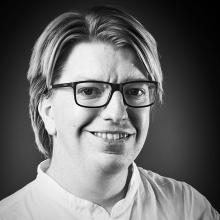Abstract
In October 1971, Frieder Nake published an article in Page, the Bulletin of the Computer Arts Society, entitled "There Should Be No Computer Art".
In this talk, we'll take a journey together to look at one aspect of computer history - creative technology and art - and the ways in which it has been misunderstood and feared at different points in our shared history and culture. Along the way, you'll also hear about how I accidentally became an artist, after being laid off from my dream job with big tech; and, how you could make your own art robots.
Interview:
What's the focus of your work these days?
I'm currently finding my feet as a freelancer, providing technology consultancy to a number of clients. The focus has been in areas where I've been successful in my previous full-time roles, specifically around Developer Relations and community coordination roles. When I am not working on specific client tasks, I spend time in our studio in Wimbledon, tinkering with 3D printers, small electronics prototypes, and artistic endeavors.
What's the motivation for your talk at QCon London 2024?
Direct answer: Chris Swan from the organizing committee, invited me to talk about my gadgets!
I became... unexpectedly unemployed (!) in November 2022, and wanted to take some time to do some new things, so I spent a lot of time in 2023 building robots that can draw. In the process I also started to look into the historical context of how we've used computers in art. It's actually a very rich and diverse story, and since I'm self-taught as a technologist and come from a degree in Modern History, it hits my niche of interests very directly. I'm excited to share what I've been learning with QCon attendees, as I can see the connective tissue between what came before in the 1960s and 1970s, and the period that we are in right now with predictive or generative "AI".
How would you describe your main persona for this session? Is there anything specific that you'd like people to walk away with after watching your session?
I think the level really is entry / introductory, but those with specific knowledge may be able to connect with the technical experiences a bit more. I know that the audience of QCon is technical, enterprise, data, architecture-oriented; possibly without as much of an opportunity to explore the more creative sides of technology. I would love folks to walk away being excited by the opportunities that technology provides us to explore, experiment, and learn.
Is there anything interesting that you learned from a previous QCon?
I have been to QCon in the past, but sadly I think the last time may have been a decade ago! There is a talk that stuck with me from a QCon before - Damian Conway's talk on Dead Languages, or Latin as a programming language! What a brilliant, brilliant concept and delivery. And, in some ways, there's potentially a parallel to my topic, in that there are principles and foundations that can be reapplied, both in languages, and tools, and in art. I honestly can't tell you what year Damian's talk was, but I remember it being in the QE II centre and at a QCon! I aspire to be as great a presenter as Damian Conway, when I grow up.
Speaker

Andy Piper
Social Bridgebuilder, IoT / MQTT Enthusiast, Formerly Developer Relations @Twitter
Andy Piper is a technologist, educator, writer, and public speaker. He holds a Master of Arts in Modern History from Brasenose College, Oxford, and he is self-taught in coding and technology.
Andy’s love of computers began in the 1980s. His first hardware project was hacking a pair of Walkman headphones into an 8-bit Acorn Electron! The emergence of affordable hardware with an educational focus (e.g. Arduino and Raspberry Pi) during the past 10-15 years has enabled Andy to continue to work at the intersection of hardware and software: building fun projects, and showing and teaching them to others.
Building his own systems and solving problems naturally led Andy to the Open Source Software movement, which is an ongoing passion. The combination of this code with Open Source Hardware platforms, has enabled opportunities such as consumer-level 3D printing. Andy is developing skills in this area as part of the Forge & Craft collaboration.
Professionally, Andy spent 10 years working as a technical consultant for IBM in the UK, and went on to build a worldwide reputation as a public speaker and developer advocate over another decade at companies including VMware and Twitter.
He is ⅓ of a weekly podcast, “Games at Work dot Biz” (available in all good podcast apps); helps with the “Makeroni” hackspace meetup at Wimbletech in Wimbledon; and loves to tinker with LEDs, and retro technology.
Andy was named in the Open UK New Year’s Honours 2023 as amongst the top social influencers of open technology in the UK. He continues to work in online communities, and provides guidance and mentoring to help others to understand complex technical concepts.





